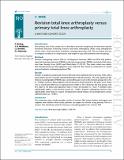Files in this item
Revision total knee replacement versus primary total knee replacement : a matched cohort study
Item metadata
| dc.contributor.author | Stirling, Paul | |
| dc.contributor.author | Middleton, Scott | |
| dc.contributor.author | Brenkel, Ivan | |
| dc.contributor.author | Walmsley, Phil | |
| dc.date.accessioned | 2020-03-13T16:30:02Z | |
| dc.date.available | 2020-03-13T16:30:02Z | |
| dc.date.issued | 2020-03-13 | |
| dc.identifier | 266539947 | |
| dc.identifier | 5a722e3b-88a0-49c2-a260-d2355183a1b7 | |
| dc.identifier.citation | Stirling , P , Middleton , S , Brenkel , I & Walmsley , P 2020 , ' Revision total knee replacement versus primary total knee replacement : a matched cohort study ' , Bone & Joint Open , vol. 1 , no. 3 , pp. 29-34 . https://doi.org/10.1302/2046-3758.13.BJO-2019-0001.R1 | en |
| dc.identifier.issn | 2633-1462 | |
| dc.identifier.uri | https://hdl.handle.net/10023/19656 | |
| dc.description.abstract | Introduction The primary aim of this study was to describe a baseline comparison of early knee-specific functional outcomes following revision total knee arthroplasty (TKA) using metaphyseal sleeves with a matched cohort of patients undergoing primary TKA. The secondary aim was to compare incidence of complications and length of stay (LOS) between the two groups. Methods Patients undergoing revision TKA for all diagnoses between 2009 and 2016 had patient-reported outcome measures (PROMs) collected prospectively. PROMs consisted of the American Knee Society Score (AKSS) and Short-Form 12 (SF-12). The study cohort was identified retrospectively and demographics were collected. The cohort was matched to a control group of patients undergoing primary TKA. Results Overall, 72 patients underwent revision TKA and were matched with 72 primary TKAs with a mean follow-up of 57 months (standard deviation (SD) 20 months). The only significant difference in postoperative PROMs was a worse AKSS pain score in the revision group (36 vs 44, p = 0.002); however, these patients still produced an improvement in the pain score. There was no significant difference in improvement of AKSS or SF-12 between the two groups. LOS (9.3 days vs 4.6 days) and operation time (1 hour 56 minutes vs 1 hour 7 minutes) were significantly higher in the revision group (p < 0.001). Patients undergoing revision were significantly more likely to require intraoperative lateral release and postoperative urinary catheterisation (p < 0.001). Conclusion This matched-cohort study provides results of revision TKA using modern techniques and implants and outlines what results patients can expect to achieve using primary TKA as a control. This should be useful to clinicians counselling patients for revision TKA. | |
| dc.format.extent | 166510 | |
| dc.language.iso | eng | |
| dc.relation.ispartof | Bone & Joint Open | en |
| dc.subject | RD Surgery | en |
| dc.subject | E-NDAS | en |
| dc.subject.lcc | RD | en |
| dc.title | Revision total knee replacement versus primary total knee replacement : a matched cohort study | en |
| dc.type | Journal article | en |
| dc.contributor.institution | University of St Andrews. School of Medicine | en |
| dc.identifier.doi | 10.1302/2046-3758.13.BJO-2019-0001.R1 | |
| dc.description.status | Peer reviewed | en |
This item appears in the following Collection(s)
Items in the St Andrews Research Repository are protected by copyright, with all rights reserved, unless otherwise indicated.

